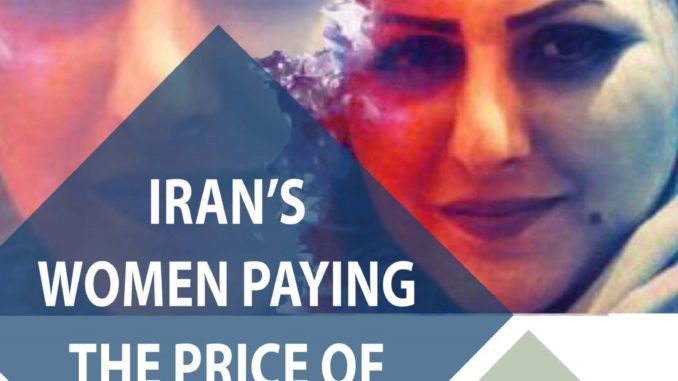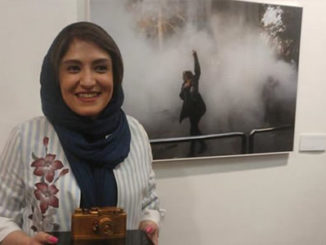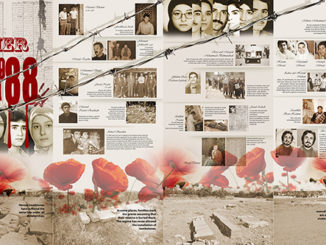
NCRI Women’s Committee Monthly Report – March 2018
 Click Here to Download the English Version
Click Here to Download the English Version
Resistance of Iranian women in prisons across Iran overshadowed the news of February and March. Topping them all was the continuing hunger strike of political prisoner Golrokh Ebrahimi Iraee and her staunch resistance along with her fellow inmate Atena Daemi. Ms. Iraee is in coma after 62 days of hunger strike in protest to her unlawful exile to the notorious Qarchak Prison in breach of the principle of separation of prisoners’ categories, demanding to be returned to the Women’s Ward in Evin Prison.
The NCRI Women’s Committee issued a call, urging human rights and women’s rights organizations to immediately take effective measures to save Golrokh Iraee and obtain her unconditional release.
Golrokh Ebrahimi Iraee and Atena Daemi
A writer and a human rights activist, Ms. Iraee has been sentenced to six years in jail for writing an unpublished book on the cruel punishment of stoning.
Her husband Arash Sadeghi, also a human rights advocate serving a 19-year prison term, put his life on the line by staging a 72-day hunger strike protesting the illegal arrest and detention of his wife, and demanding her release.
The imprisoned couple attracted nationwide and global support, forcing the regime to release Ms. Iraee. Nevertheless, security forces re-arrested her in January 2017 reneging on the promise made by the Prosecutor.
Throughout her imprisonment, Ms. Iraee has been speaking out against the regime’s injustices, her latest being an open letter on January 9 amidst the nationwide uprising demanding regime change.
She called on Iranian youths to endure and pay the price of freedom. In part of her letter, she wrote, “The (regime’s) treacherous rule can be overthrown if we step onto the road with open eyes, and if we realistically understand that we have to thread a long way at a heavy cost. And our enemy is ferocious. If we are thinking of freedom from the yoke of tyranny, if we want to no longer beg for our rights in our own homeland, we must evaluate the price we have to pay in this difficult path. By experience, we know that this price includes imprisonment, torture and execution and being accused of waging war on God. We must not fear the difficulties. We must believe that every fear can be overcome, every demand can be achieved and every wall of oppression can be smashed.”
It was in reaction to this call, that the regime took reprisal on her and her fellow inmate Atena Daemi who had sent out a similar open letter a few days earlier. Evin’s Prosecutor fabricated a new case against the two political prisoners and summoned them five times for interrogation.
Finally, on January 24, 2018, the resistant prisoners were taken by force for interrogation to the IRGC Ward 2A in Evin and in reaction to their strong resistance, they were brutalized and transferred unlawfully to the notorious Qarchak Prison in Varamin.
Golrokh Iraee and Atena Daemi demanded to be returned to Evin, setting a deadline of 10 days before going on hunger strike to protest the regime’s breach of the principle of classification and separation of prisoners and their illegal exile to Qarchak.
On February 3, they started their hunger strike and switched to dry hunger strike on February 10. The two prisoners’ conditions rapidly deteriorated in light of the deplorable prison conditions.
Atena Daemi who had been on hunger strike for 54 days in April and May 2017, ended her hunger strike on February 15, “to stay alive and remain as a thorn in the eyes of (her) enemies.”
In an audio message, she said, “Don’t tire yourselves because I will never back down from my positions. I will never apologize for the crime I have not committed, because as a human being I am entitled to freedom of speech, opinion and protest, and no one should deprive me of my rights. I tell you that every day I will let the world know of the lack of independence of the Judiciary and the injustice and oppression. Every day, I will shout in your ears of your own laws being broken by yourselves. You beat up and brutalized and arrested my family. Wait for the consequences of this savagery.”
Ms. Iraee’s conditions in Qarchak Prison has been excruciating. Qarchak Prison is a disused chicken farm that holds hundreds of women convicted of violent offences in conditions falling far below the UN Standard Minimum Rules for the Treatment of Prisoners (the Nelson Mandela Rules). Common complaints include urine-stained floors, lack of ventilation, insufficient and filthy bathroom facilities, prevalence of contagious diseases, poor quality food containing small pieces of stone, and salty water.
On February 20, Ms. Iraee and Ms. Daemi were deprived of contacting their families and can call them only once a week in the presence of prison agents. They were held in conditions similar to solitary confinement. They were not allowed to leave the ward and no one had permission to visit them.
The National Council of Resistance of Iran (NCRI) issued a call on February 21, 2018, urging international human rights and women’s rights organizations to take immediate and effective measures to save the lives of two jailed hunger striking prisoners, Mrs. Golrokh Iraee and Mr. Sohail Arabi,[1] who are at risk.
Amnesty International issued a statement on March 9, 2018, expressing alarm at the condition of Golrokh Iraee and demanding her and Atena Daemi’s immediate release.
AI wrote, “Golrokh Ebrahimi Iraee, who has been on hunger strike for 35 days, is in very poor health. In the past week, she was placed on IV fluids without her consent, and at times has been unable to move. She is suffering from severe cramping in her muscles, which the prison doctor has confirmed is a result of the hunger strike.”
Philip Luther, Amnesty International’s Research and Advocacy Director for the Middle East and North Africa, has been cited as saying, “We are extremely alarmed by reports from Shahr-e Rey prison about the targeting and escalating ill-treatment of Golrokh and Atena. They should never have been imprisoned in the first place, and now it seems the Iranian authorities are deliberately subjecting them to cruel, inhuman and degrading treatment because of their outspoken activism and continued human rights work even behind bars.”
Ms. Iraee and Ms. Daemi originally detained in the Quarantine Ward, were again brutalized on Monday, March 12, 2018, and dragged to the ward of mothers where pregnant women and some 20 children are detained with their mothers. Considering the state of health of hunger striking Golrokh Iraee, the mothers’ ward is an additional pressure on her.
Haj Moradi, deputy Prosecutor of Evin overseeing political prisoners, has told the prisoners’ families that Golrokh will not be returned to Evin even if she dies. Other reports indicate that the order for transfer must be issued by Tehran’s Prosecutor, Jaafari Dowlatabadi.
On March 15, Chair of the Human Rights Subcommittee (DROI) of the European Parliament, Mr. Pier Antonio Panzeri (S&D, IT), expressed grave concern over the detention of two women human rights defenders in Iran and called for their immediate release. He said they are serving lengthy and unjust prison sentences that were handed down solely for their peaceful human rights work.
He wrote in his statement, “Golrokh Ebrahimi Iraee and Atena Daemi should also be given urgent and adequate medical attention and care due to their fragile and deteriorating state of health as a result of their lengthy hunger strike and ill-treatment, including previous harassment and physical attacks by other inmates and guards. I call on the prison administration and the relevant authorities to guarantee regular contacts with family members, including prison visits and phone calls. I also call on the authorities to take immediate steps to improve the detention conditions and facilities at Shahr-e Rey prison.”
On March 19, four UN experts issued a statement in Geneva expressing alarm “at the continued targeting of human rights defenders in Iran, including about reports that two well-known women human rights defenders have been subjected to beatings in detention.”
The statement said, “On 12 March, the two defenders were reportedly beaten by riot guards following a disturbance, and then transferred to the general ward of the prison.”
The experts noted in their statement, “We have attempted to initiate a dialogue with the authorities on this issue, to no avail. We call for the immediate release of Atena Daemi and Golrokh Ebrahimi Iraee, as well as the release of all those who have been imprisoned for exercising their rights to freedom of expression and peaceful assembly.”
The experts called on the authorities to carry out a prompt and impartial investigation into the allegations of beatings, and to ensure accountability for such actions.
At the time of writing, Golrokh Iraee has gone into coma and reportedly transferred to a hospital near Shahr-e Ray (Qarchak) Prison for her constant feeling of nausea and vomiting bile due to damaged gall bladder. The hospital’s name has not been announced. There has been no news of Ms. Iraee after her hospitalization and her family’s inquiries have not been responded to.
Maryam Akbari Monfared
Another newsmaker was Maryam Akbari Monfared who spoke out from behind bars, rebuking Salavati, one of the clerical regime’s notorious judges, who sentenced Ms. Akbari to 15 years’ imprisonment.
In a strongly-worded open letter, Maryam Akbari Monfared reacted by listing the mullahs’ crimes during their rule and boasted of having opposed the regime. She said, “My enchained compatriots and I are the ones who must grant amnesty.”
The letter published on March 30, 2018, read in part: “In that dark environment which did not have any opening to freedom and justice, a generation of pioneers who could not be intimidated or enticed, revealed the inhuman and medieval nature of this regime. Hail to the martyrs who gave their lives for freedom, hail to the martyrs of the 1980s, the martyrs of the 1988 massacre, who sowed the seeds of protest and resistance in Iranian society and made the world bow before their magnificence…
“The 1988 massacre laid the foundation for a regime of executions, an incessant cycle of executions which has been implemented up to this date. The Islamic Republic has brought none but carnage, plunder and bloodshed for Iran and Iranians. It has stolen the country’s wealth and resources. The banks and pension funds have gone bankrupt, people are hungry and the economy has been crippled…
“Amidst so much misery and misfortune, the mullahs have sensed that their end is imminent. They seek to cover up so many years of oppression and what they have done to the people of Iran with the deceit of amnesty.
“What I have briefly enumerated is a response to Abolghassem Salavati who told my husband after his latest inquiry, ‘Let me check out and see whether her name is on the amnesty list.’
“After nine years of imprisonment, I am proud and steadfast and my heart is filled with joy for all of its moments. Not only I demand justice for my sister and brothers, but also for myself for the life you stole from me, the childhood you stole from my children and deprived them of living for nine years. So, my enchained compatriots and I are the ones who must grant you amnesty.
“With all my love and faith, I extend my warmest salutes to the martyrs who fell for freedom and to the martyrs of the uprising in December and January who became symbols of honesty, selflessness and perseverance.”
Maryam Akbari also declared her solidarity with Golrokh Iraee by going on a three-day hunger strike and urging international human rights organizations to take urgent action to save Ms. Iraee’s life. Addressing Ms. Iraee, she wrote, “May be this is a difficult, painful and agonizing life but let there be no doubt that we did the right thing. We will overcome this suffering. Today, freedom is one day closer to us.”
Mothers of political prisoners
Mothers of political prisoners also stood for their children.
Mrs. Dayeh Sahrifeh was summoned on February 2, 2018, by the Department of Intelligence of Sanandaj and pressured to cooperate in breaking the hunger strike of her sons in prison.
Mrs. Sharifeh’s sons, Ramin and Afshin Hossein Panahi, are political prisoners condemned to death and 8 years in prison, respectively.
Dayeh Sahrifeh braved the Intelligence Department officials and said, “My sons have been unjustly sentenced to unfair sentences. A great injustice has been done to them. If the regime does not answer their demand, their father and I will set ourselves on fire in front of the Department of Intelligence of Sanandaj.”
Mrs. Farangis Mazloum has also staged a campaign to save the life of her son. She has been calling for demonstrations and protests in front of prisons, the parliament and other places to pressure the officials to release her son, Soheil Arabi, a web blogger who has been imprisoned for writing against the regime’s unjust practices.
Women’s protests
Another manifestation of Iranian women’s resistance was in their participation in anti-government protests. Altogether, they participated in at least 55 protests and demonstrations in February and March.
International Women’s Day
On the International Women’s Day on March 8, Iranian women took to the streets of Tehran after 39 years and staged a protest outside the Labor Ministry.
Women held placards which read, “No to gender-based discrimination”, “no to discriminatory labor law”, “equal and fair wages for women”, “Freedom, equality, justice.”
Security forces, plainclothes agents and female troops stationed in the area, attacked the participants and brutalized them with batons and shockers. Security forces did not allow anyone to take pictures or shoot films of this gathering.
At least 59 women and 25 men were arrested. They were accused of “acting against national security.”
At least 14 of the arrested women were transferred to Qarchak Prison in Varamin where they were deprived of access to water and hygienic material.
Mahshid Pour Assadi, graduate of philosophy from Tehran’s Allameh University; Marzieh Amiri, student of Social Sciences at Tehran University; and Atefeh Khosravi, a medic; were detained in the general ward of Qarchak Prison.
The secretariat of the National Council of Resistance of Iran issued a statement, calling on international organizations to condemn the raid on women and take urgent action to free those arrested.
Protests in Ahwaz
Thousands of women also actively participated in the late March protests in Ahwaz, capital of Khuzistan Province in southwestern Iran.
The protests starting on March 28 and continuing into April were against racist approach of the state television against Iranian Arabs.
Protesters put on Arabic garbs and chanted slogans in Arabic and Farsi, demanding resignation of the head of the state Radio and Television Station in Khuzistan, official apology to the Arab ethnic group from managers of the state Television Network 2, and reprimanding of those in charge of the racist program.
At least two women, Ayesheh and Khadijeh Neassi were identified among hundreds arrested in these protests in cities and villages across the province.
Yarsan women
At least 70 women dervishes were taken to Qarchak Prison. They were among those arrested during the crackdown on the dervishes’ gathering in in Tehran on Monday night, February 19 which carried through until Tuesday morning, February 20, 2018. They were brutalized and taken to the Quarantine Ward 3. A pregnant woman, Leili Nayeb Zadeh, was among those arrested.
A spokesman for the State Security Force acknowledged that at least 300 people (including a large number of women) had been arrested during a raid on the protest gathering of dervishes in Tehran
The NCRI Women’s Committee issued an urgent call on February 20, urging international human rights organizations to undertake immediate measures to have the arrested women released.
Amnesty International issued an Urgent Action on March 29, 2018, condemning the arbitrary arrest and ill-treatment of 11 women from Gonabadi Dervish religious minority. AI statement said security forces resorted to beatings, firearm use, water cannons and tear gas to disperse the crowd. The women were taken to Vozara detention centre where they said they were subjected to intrusive body searches by female officers, intimidating interrogations, insults and yelling. In the following 24 hours, the authorities transferred 10 of the women to the quarantine section of Shahr-e Rey prison near Tehran and released the rest.
Those transferred are Shokoufeh Yadollahi, Sepideh Moradi, Maryam Farisani, Nazila Nouri, Sima Entesari, Shima Entesari, Shahnaz Kiani, Maryam Barakouhi, Elham Ahmadi, and Avisha Jalaledin. After several days, an 11th woman, Sedigheh Safabakht, who was apparently held in Evin prison before, was also transferred to Shahr-e Rey prison. There are reports that some women are undergoing late-night interrogations involving verbal abuse and threats.
In recent days, women prisoners have complained that fumes have escaped from the drainage system, filling their rooms with foul odours. As a result, Shima Entesari, who suffers from asthma, has experienced severe breathing difficulties requiring supplemental oxygen. Additionally, eyewitnesses have said that security forces severely beat Shokoufeh Yadollahi at the time of her arrest, resulting in head injuries. The authorities have denied her access to medical care apparently after she refused to be transferred to hospital in handcuffs and leg cuffs.
Student arrests
In continued crackdown on participants in the nationwide uprising in December and January, the regime arrested more women, university students, or handed out heavy sentences for them.
Leila Hosseinzadeh, a student of anthropology at Tehran University, was sentenced to six years in jail – five years for assembly and collusion and one year for propaganda against the state. She was also banned from leaving the country for two years.
Banafsheh Cheraghi, a sciences student at Tehran University, was arrested at home on Tuesday, March 6, 2018, by security forces.
Parisa Rafii, 21, a student of photography at Tehran University’s School of Fine Arts, was abducted by plainclothes agents as she was leaving the school on February 25, 2018.
Despite completion of her preliminary investigations and interrogations in Evin Prison, she has not been released due to what her interrogator described as “lack of cooperation.”
A young woman, Roya Saghiri, 24 was tried in Tabriz and sentenced to nearly two years’ imprisonment for disseminating propaganda against the regime and insulting the mullahs’ leader. Ms. Saghiri is also accused of “appearing in public without the religious Hijab (veil) by removing her scarf on the street.”
Ms. Saghiri was arrested at Sa’at Square of Tabriz on December 31, 2017, and has been detained since in the Women’s Ward of the Central Prison of Tabriz, capital of the northwestern Iranian Province of East Azerbaijan.
Woman, her children taken hostage
The regime also took hostage the wife of a Kurdish activist.
The wife and two children of a Kurdish activist were arrested by agents of the Intelligence Department on Saturday, March 3, 2018, when they arrived at the Airport of Tabriz from Istanbul, Turkey, where they had visited their husband and father, Barzan Faroughi.
The children, 12 and 5, were released after three days, but Mrs. Shetaw Faroughi remains in detention. She was transferred to the Central Prison of Sanandaj, capital of the Iranian Kurdistan Province, on Saturday, March 24, 2018.
Mrs. Faroughi has to provide a bail bond of 200 million toumans to be temporarily released.
Heavy sentences for opposing the compulsory veil
In a statement published in all the state-run media on February 23, 2018, the State Security Force announced, “According to paragraph 2 of Article 639, encouraging people to shun the veil is punishable by one to 10-year prison sentence. This sentence cannot be transformed to other forms of punishment.”
Accordingly, Maryam Shariatmadari was sentenced to one year in jail on the charge of “encouraging corruption through removing her veil.” The decree was issued on March 25, 2018, by the 2nd Criminal Court of Tehran Province.
Maryam Shariatmadari, 32, is a student of Computer Sciences at Tehran’s Amir Kabir University. She was pushed off a telecoms box by a State Security Force officer and hurt in the knee on February 23, 2018, when she was protesting the compulsory veiling by removing her shawl.
The Women’s Committee of the National Council of Resistance of Iran condemns any form of attack, brutalizing or hurting the women who oppose the compulsory veil. The Women’s Committee has also called for the immediate release of all women who have been arrested and imprisoned for improper veiling or removing their veil, and for protesting and opposing the compulsory veil and considers imprisonment verdicts for protesters against the compulsory veil as unjust.
[1] Political prisoner Sohail Arabi was banished to the Greater Tehran’s Prison, aka Fashafouyeh, for going on hunger strike and protesting the unlawful transfer of Atena Daemi and Golrokh Iraee to Qarchak Prison. He ended his hunger strike on the eve of the Persian New Year after 55 days. He was brutalized in prison while on hunger strike and was suspected of suffering brain damage due to harsh beatings on his head.
Mr. Arabi’s mother, Farangis Mazloum, has staged a campaign to save the life of her son but has not been able to secure his release or even visit him.




